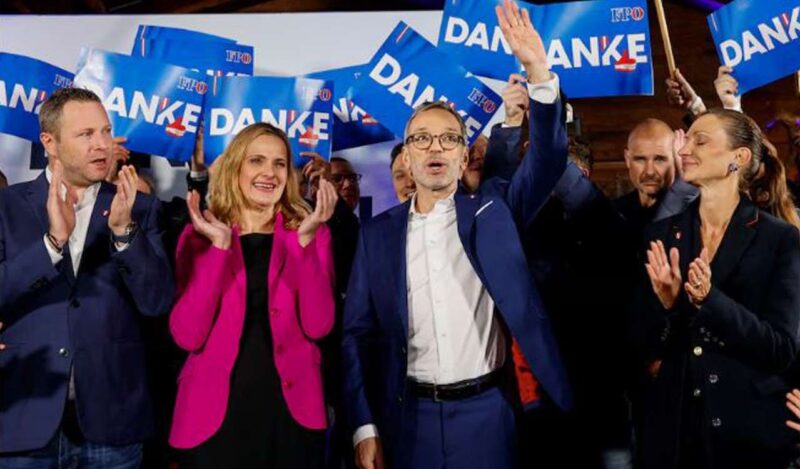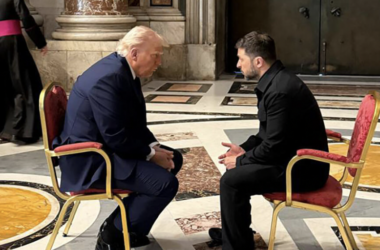In a dramatic reshaping of Austrian politics, the Freedom Party of Austria (FPÖ) has delivered a historic electoral performance in the Viennese state parliament elections on April 27, 2025. Once considered an outsider force in Austria’s cosmopolitan capital, the FPÖ surged from a distant last place in 2020 to a solid second place, tripling its vote share and overtaking the beleaguered center-right Austrian People’s Party (ÖVP). This political earthquake not only cements FPÖ’s role as the dominant force in Austrian politics but also signals the waning grip of the left-liberal establishment in Vienna and beyond.
From Margins to Mainstream: FPÖ’s Vienna Breakthrough
Led by Vienna party chief Dominik Nepp and national leader Herbert Kickl, the FPÖ’s Vienna campaign defied the odds and decades of political orthodoxy. Once dismissed as unelectable in a city known for its deep red roots—the Socialist Party of Austria (SPÖ) has governed Vienna uninterrupted for over 80 years—the FPÖ’s leap from 7.1% in 2020 to 20.8% in 2025 represents one of the most significant shifts in postwar Austrian electoral history.
The SPÖ still holds the top spot, but its grip is loosening. Dropping two points from its 2020 performance, it now sits at 39%. More significantly, its traditional rival, the ÖVP, collapsed, losing more than half its support and finishing last with just 9.7%. Once a serious contender, the ÖVP now finds itself in electoral freefall, largely abandoned by its traditional base.
The liberal NEOS, currently the SPÖ’s coalition partner in the city government, gained modestly, finishing with 9.8%, their best showing yet. But these numbers obscure the larger picture: the political energy is clearly with the FPÖ, which is surging not only in Vienna but nationwide, where it continues to lead all polls with a commanding 34% and Herbert Kickl is the public’s top choice for chancellor with 38% support.
Why the FPÖ’s Victory Matters
Vienna is not just Austria’s capital; it is its cultural and political nerve center. For decades, the city has been a laboratory for left-liberal social policies: open immigration, expansive welfare programs, and progressive education reforms. Critics argue these policies have increasingly alienated native Viennese residents and created parallel societies. The FPÖ’s success indicates that voters are no longer willing to tolerate the social and economic consequences of these policies.
The data tells a compelling story. Although Muslims make up roughly 8% of Vienna’s overall population, they now represent 41% of schoolchildren in the capital, while Christian students have fallen to just 34%. These demographic changes have alarmed many Viennese citizens who feel their cultural identity is being eroded. While the mainstream parties dismissed such concerns as xenophobic or outdated, the FPÖ listened—and responded.
Their campaign relentlessly focused on issues that matter to ordinary citizens: safety, culture, and national identity. Rising crime rates, gang violence, and public housing tensions—often linked to failed integration policies—were central to the FPÖ’s message. They presented themselves as the only party willing to confront the challenges of uncontrolled immigration and restore law and order.
The Collapse of the Center-Right
Perhaps the most dramatic consequence of the Vienna election is the complete disintegration of the ÖVP. Their decision to prioritize coalitions with the SPÖ and marginalize the FPÖ, despite both parties sharing a conservative voter base, has cost them dearly. Voters punished the ÖVP for what they perceive as ideological betrayal—an abandonment of conservative values in favor of political expediency.
This pattern mirrors developments across Europe. In Germany, the Christian Democrats (CDU) have seen their poll numbers plummet after cozying up to the left and distancing themselves from the right-wing Alternative für Deutschland (AfD), which now frequently tops national polls. In Sweden, Italy, and the Netherlands, conservative voters are also turning away from traditional parties in favor of nationalist-conservative alternatives that promise to defend cultural heritage and restore public order.
The message is clear: the era of “grand coalitions” that blend center-left and center-right ideologies into indistinguishable policy mush is coming to an end. Voters want clarity, conviction, and real alternatives—not watered-down centrism.
An Establishment in Denial
Despite the wake-up call delivered by Vienna’s electorate, Austria’s establishment parties appear unwilling or unable to change course. The SPÖ continues to govern with NEOS, maintaining the same ideological commitments that voters just repudiated. Their leadership portrays the FPÖ’s success as a protest vote or a temporary fluke—an interpretation that risks repeating the same mistakes.
Instead of introspection, the mainstream media and political class often resort to moral panic. Accusations of extremism and populism are hurled at the FPÖ, yet these labels seem to carry less weight with each passing election. Increasingly, Austrians see these attacks not as objective warnings, but as the cries of a threatened elite clinging to power.
Moreover, the fact that the FPÖ is a founding member of the Patriots for Europe (PfE) alliance—a new right-wing European parliamentary bloc—gives it an added layer of legitimacy and momentum. Its growing international partnerships allow it to challenge the EU’s progressive orthodoxy and align Austria with other sovereign-minded nations like Hungary, Italy, and potentially France, where Marine Le Pen’s National Rally continues to surge.
The implications of the FPÖ’s Vienna breakthrough extend far beyond municipal politics. Austria is heading toward a reckoning at the national level. The federal government, currently a fractious coalition between the SPÖ and the ÖVP, appears increasingly out of touch with public sentiment. With economic stagnation, rising energy prices, and persistent immigration-related tensions, many Austrians are looking for a decisive break from the status quo.
Herbert Kickl has capitalized on this desire for change with a message rooted in sovereignty, national pride, and democratic accountability. His emphasis on protecting Austria’s cultural integrity, securing its borders, and resisting EU overreach resonates with large segments of the population. In contrast, the technocratic and ideologically rigid responses of the current government appear increasingly inadequate.
A Shift Worth Watching
The 2025 Vienna election marks a turning point not just for the FPÖ but for Austrian—and perhaps European—politics. The party’s meteoric rise is a testament to the power of listening to voters, standing firm on principles, and challenging a complacent and often arrogant political class.
For decades, the left-liberal establishment in Austria treated Vienna as its unassailable fortress. That illusion has now shattered. If the establishment continues to ignore the message sent by voters—on immigration, cultural identity, and public safety—it risks irrelevance. Meanwhile, the FPÖ’s continued rise may soon bring not only a new political order in Vienna, but a new governing majority in Austria.




